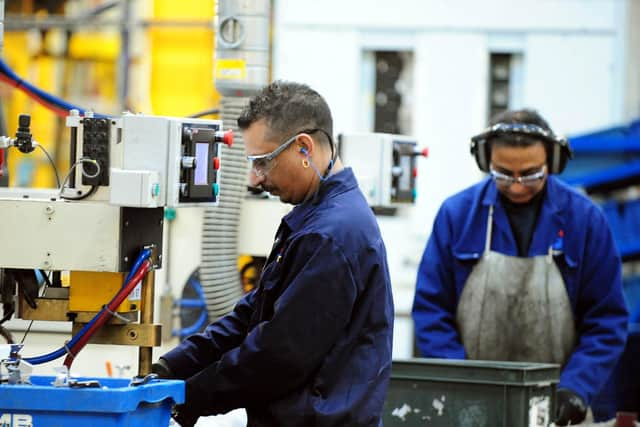Manufacturers slash jobs as inflationary and supply pressures trap sector in negative territory
The closely-watched S&P Global/Cips purchasing managers’ index (PMI) for the sector scored 46.5 in November, edging up from a 46.2 reading for October. Experts had predicted it would remain at 46.2 for November. Any reading below 50 is considered to show that the sector is in contraction.
Despite the slight uptick last month, the report highlighted it was still one of the “lowest levels during the past 14 years”. Experts said declining sentiment in the face of inflation led to more job losses over the month, with the rate of job cutting at its steepest in two years.
Advertisement
Hide AdAdvertisement
Hide AdRob Dobson, director at S&P Global Market Intelligence, said: “November saw a further contraction of the UK manufacturing sector as weak demand, declining export sales, high energy prices and component shortages all hit industry hard. The outlook for the sector also darkened, as confidence among manufacturers fell to its lowest level since April 2020. Weak sentiment and declining intakes of new work led to job losses, a retrenchment in purchasing activity and an accumulation of finished goods inventory that will likely provide a further brake to output during the months ahead.”
Companies reported lower staffing in November as a result of a downturn in new order intakes. Total levels of new work declined further as manufacturers revealed weaker demand in both domestic and overseas markets. New export business contracted at the fastest pace for two-and-a-half years as demand from the EU, China and US all “deteriorated”.
Mike Thornton, national head of manufacturing at RSM UK, the audit, tax and consulting firm, said: “When looking in more detail at the data, business optimism is plummeting, as new orders and output declined further in November, as a result of supply chain disruption and continued global material shortages. The fallout of Brexit and more recently the mini-Budget also appear to have weakened relationships with key global export markets, especially in the EU, the US and China.
“With Chancellor Jeremy Hunt now setting out plans to relaunch the UK’s industrial strategy, manufacturers will be eagerly awaiting to see what this means in terms of investment in skills and technology for growth, as well as re-establishing international markets over the coming year.”
Maddie Walker at Accenture UK noted: “With inflationary pressures, tight labour market conditions and the ongoing cost of living crisis, manufacturers are understandably pessimistic about the future which has hurt output.”


John Glen, chief economist at the Chartered Institute of Procurement & Supply (Cips), added: “Evaporating consumer confidence and fewer orders from previously strong markets such as the EU, US and China compounded the problem of a weakening marketplace. One vestige of hope is that with stock levels rising at the fastest rate for over three-and-a-half years, supplier deliveries to end consumers and other manufacturers should be much quicker once the economy starts to improve as pressure on delivery times was the least marked since January 2020.”
Comments
Want to join the conversation? Please or to comment on this article.